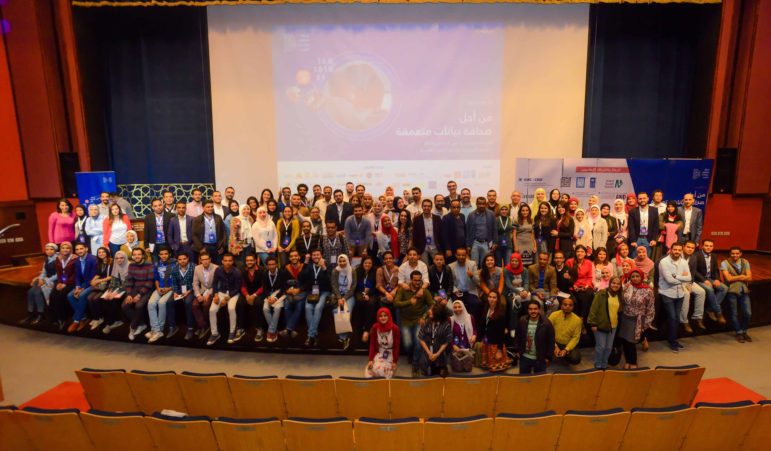
All in the Family: Journalists gather for the first Arab Data Journalism Conference in Cairo in March.
Egypt isn’t known for being the most open of societies, or the friendliest country for journalists. Far from it. Last year, Reporters without Borders dubbed it one of the world’s largest prisons for those working in the media. The local authorities’ most recent move was shuttering independent news website Masr al-Arabia for its coverage of the country’s presidential elections and arresting its editor. This is what makes its capital an unlikely place for the first Arab Data Journalism Conference.
From March 6 to 8, more than 340 journalists from 17 countries descended on the American University Cairo campus to hear speakers from Egypt, along with their Arab colleagues and trainers from around the world, talk about everything from data collection and cleaning to in-depth reporting and data verification at the community’s inaugural conference.
In the Middle East and North Africa (MENA), where the bulk of the land surface is desert, people have a hard time locating water, never mind ferreting out data on which they can base good journalism. In fact, the most recent Open Data Barometer noted that no country in the region publishes data – open or closed – and that the general absence of political leadership on the state of data has led to a lack of awareness, capacity and legal frameworks.
Yet despite the difficulties, representatives from several data projects in the MENA region made their way to Cairo last month to share their initiatives to help other Arab journalists, as well as academics and researchers, access reliable data that’s easy to find and delivered in usable formats.
 Founded in 2012 as part of a training project with the International Center for Journalists (ICFJ) to support digital journalism initiatives in the Middle East, the Cairo-based Infotimes team is composed of data geeks, insightful coders and innovative designers. They dig into whatever information they can get their hands on – from public reports and court and police records to data sets from international organizations – to come up with data-based conclusions and stories on various topics. The group recently published articles about the number of deaths inside Egyptian prisons, a comparison between the Egyptian President Abdel Fattah al Sisi’s political decisions and his administrative ones, and the country’s domestic murder rates.
Founded in 2012 as part of a training project with the International Center for Journalists (ICFJ) to support digital journalism initiatives in the Middle East, the Cairo-based Infotimes team is composed of data geeks, insightful coders and innovative designers. They dig into whatever information they can get their hands on – from public reports and court and police records to data sets from international organizations – to come up with data-based conclusions and stories on various topics. The group recently published articles about the number of deaths inside Egyptian prisons, a comparison between the Egyptian President Abdel Fattah al Sisi’s political decisions and his administrative ones, and the country’s domestic murder rates.
Amr Eleraqi, a co-founder of both Infotimes and the Arab Data Journalists’ Network, told GIJN that the group provides content development to newsrooms and helps create and implement data journalism teams. They also develop tools to help journalists deal with data in all its various forms, including technology that helps them extract data from Twitter as well as the Arabic version of RAWGraphs. For independent journalists, Iraqi says his team offers training, both inside and outside Egypt, on data visualization, data mining and cleaning and how to use spreadsheets, among other topics.
 The Arab Reporters for Investigative Journalism (ARIJ) Data Desk Project was launched in 2013 at the ARIJ offices in Amman. The team primarily supports the group’s data-driven stories, particularly with corruption-related investigations. Since its launch, it has developed a database of company and court records from 11 Arab countries, including offline resources – documents that researchers and journalists obtain in hard copy from sources – and online company records, including court documents and government contracts, concessions and regulations. Team leader Carol Kerbaj told GIJN that plans are in the works to expand the database to 20 additional countries in the region by 2020.
The Arab Reporters for Investigative Journalism (ARIJ) Data Desk Project was launched in 2013 at the ARIJ offices in Amman. The team primarily supports the group’s data-driven stories, particularly with corruption-related investigations. Since its launch, it has developed a database of company and court records from 11 Arab countries, including offline resources – documents that researchers and journalists obtain in hard copy from sources – and online company records, including court documents and government contracts, concessions and regulations. Team leader Carol Kerbaj told GIJN that plans are in the works to expand the database to 20 additional countries in the region by 2020.
In addition to the database, the team responds to requests about statistics, public records and company information in the region as well as assisting on stories with journalists, partner organizations, academics, human rights groups and students. It also collaborates on cross-border investigations, including the Swiss Leaks and Panama Papers, through ARIJ partners, such as the ICIJ and the Organized Crime and Corruption Reporting Project.
This initiative aims to enhance knowledge of development issues in the MENA region by improving the scope, depth, reliability and availability of information about issues such as health, gender and poverty. It is a bilingual platform, presented in both Arabic and English, and is considered to be the biggest open database in the region, with advanced tools for data browsing, extraction and visualization. Its database currently contains more than 2,000 indicators in sectors such as energy, labor and trade, which are extracted from national statistics offices and international organizations. Its resource repository is home to over 1,000 publications, which includes everything from refugee reports to information on agriculture, inequality and finance.
The main goal for this startup project, established in 2017 in Bahrain, is to make difficult-to-understand data more digestible for Arab youth, transforming dry numbers and facts into state-of-the-art visualized content. The Bayanat Box team takes reports, spreadsheets and statistics from reliable sources, such as the United Nations, and creates infographics, video graphics and charts. So far, the team has published stories about Arab migration, Saudi Arabia’s slow progress on women’s employment and the number of Arab children without sufficient nutrition and education.
Co- founder Alyia Alali, a former World Bank researcher, says the team constantly experiments with content to figure out what works best for delivering data via social media feeds to their readership, with a focus on countries where data is most available, including Egypt, Lebanon, Bahrain and Jordan.
 Majdoleen Hasan, GIJN’s Arabic Editor, is an award-winning journalist. She has worked with Global Integrity, 100Reporters and Arab Reporters for Investigative Journalism. She was director of an investigative journalism unit in Jordan and the first Jordanian to file a case against the government for denying her access to public information.
Majdoleen Hasan, GIJN’s Arabic Editor, is an award-winning journalist. She has worked with Global Integrity, 100Reporters and Arab Reporters for Investigative Journalism. She was director of an investigative journalism unit in Jordan and the first Jordanian to file a case against the government for denying her access to public information.

